Cherish Became One Family
Every three years, we set out our goals and objectives for the short-term future in a strategic plan. When developing our Strategic Plan for 2004–06, it became clear that society was very different and that one-parent families now existed in many forms in Ireland. In recognition of these changes, we extended our services to all members of all one-parent families and renamed ourselves One Family.
Today, while society has progressed, many of the same barriers that must be overcome by people parenting alone as they attempt to access employment and education remain; and the Constitution, far removed from the reality for today’s families, still only recognises the married family form.


In 1977, an election year, Cherish lobbied politicians on the abolition of the concept of illegitimacy. The formal campaign began in January 1979 when Cherish brought out a discussion document ‘Abolishing Illegitimacy’. It was widely distributed to media and promoted a lively debate on the subject.
In 1980 Cherish raised the issue at a National Women’s Forum run by CSW, (now the National Women’s Council of Ireland). Two conference workshops passed resolutions calling for the abolition of illegitimacy.
In 1981 a revised issue of ‘Abolishing Illegitimacy’ was issued. It recommended that unmarried couples should have the option of making a ‘mutual declaration of parentage and joint custody’. It also recommended that children should have the same inheritance rights as those born within marriage, and rejected the automatic guardianship rights for all fathers.
In the same year the Status of Children Bill was introduced and Cherish was invited to speak on the subject at meetings around the country.
In 1987, after many years of campaigning, the Status of Children Act finally abolished the status of illegitimacy. The purpose of the Bill was to equalise the rights under the law of all children, whether born within or outside of marriage.
The Bill also introduced important new provisions regarding declarations of parentage, blood testing as an aid to establishing paternity, presumptions of parentage and other evidential matters. Finally, it amended the law dealing with the registration of births of children whose parents are not married to each other.
The Act was passed eight years after the first Discussion Document from Cherish, 13 years after the first conference in 1974. 15 years after the foundation of Cherish. The campaign for change was a long haul – but worth it.